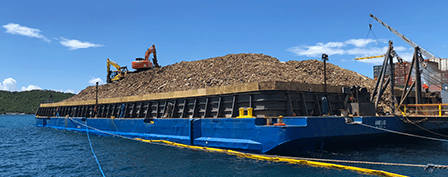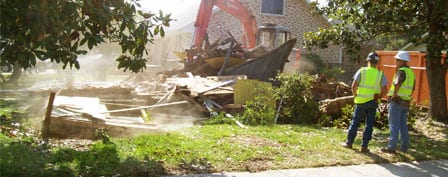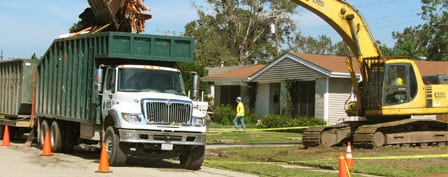Hurricanes
Hurricanes
are one of the most destructive forces on the planet causing massive damage across a very large area. One of the most immediate requirements after a storm is to cut and toss debris from major roadways so emergency teams can perform their life-saving functions. Very shortly thereafter, large numbers of specialized trucks and equipment must be brought in to clear vegetative (i.e., tree) and building material debris so electricity can be restored and rebuilding can begin. Flooding often occurs during these events contributing even more debris for municipal leaders to remove so that residents can restore their properties. Other damage, like environmental hazards, dead animal carcasses, damaged levees and choked waterways, pose major challenges for emergency planners and officials.

Case Study: Hurricane Michael – Georgia
In October 2018, Hurricane Michael ripped through Georgia leaving damage and destruction in its path, with the hardest hit areas in Southwest Georgia. As a result, Ceres was activated by the U.S. Army Corps of Engineers (USACE) to remove debris in 13 Southwest Georgia counties.
Ceres collected a total of 4.7 million cubic yards of debris. At the mission’s peak, Ceres was able to haul 140,000 cubic yards – approximately 3% of the total project – in a single day. The consistency of this type of significant progress allowed us to finish on schedule with the USACE staff draw-down plan. Ceres received the highest possible quality rating for this work – Exceptional – based in part on our high production rates despite numerous scope changes and severe weather.

Case Study: 2017 Hurricane Season
In August 2017, Ceres responded to seven jurisdictions in Texas following Hurricane Harvey. Within the next several weeks, Ceres responded to 35 jurisdictions in Florida and performed two emergency contracts in Georgia after Hurricane Irma. Additionally, Ceres worked under the U.S. Army Corps of Engineers (USACE) in Puerto Rico and the Virgin Islands, where both Hurricanes Irma and Maria caused severe damage and devastation.

Case Study: Hurricane Katrina
Hurricane Katrina was the third major hurricane and first Category 5 hurricane of the record-breaking 2005 Atlantic hurricane season. Slamming the Louisiana coast as a Cat 3 on August 29, 2005, the 25-foot storm surge caused catastrophic damage along the coastlines of Louisiana, Mississippi, and Alabama. Levees separating Lake Pontchartrain from New Orleans were breached by the surge, ultimately flooding about 80 percent of the city.
Katrina is estimated to be responsible for $81 billion in damages, making it the costliest hurricane in United States’ history. Ceres is proud to have been on the front lines in cleaning up and rebuilding communities all across the Gulf Coast.

The numbers tell a powerful story.
The following are documented statistics relating to Ceres’ role in the Katrina recovery effort:
- 13,439,358 yards of debris hauled/reduced/disposed
- 194,584 yards/day during peak production
- 4,550,342 yards in first 30 days
- 315,725 white goods hauled/processed/disposed
- 37,033 electronic goods hauled/disposed
- 2,006 buildings demolished
- 5,200,000 total project hours
- 1,018 subcontractors
- 7,847 certified placarded vehicles
- 56 debris reduction sites operated simultaneously
- Operations across 14 counties in Louisiana and Mississippi
Ceres’ Hurricane Experience
Some of the hurricane events in which Ceres has completed significant contracts:
- Delta 2020, Category 1
- Laura 2020, Category 4
- Sally 2020, Category 2
- Zeta 2020, Category 2
- Dorian 2019, Category 5
- Michael, 2018, Category 5
- Florence, 2018, Category 1
- Maria, 2017, Category 5
- Irma, 2017, Category 5
- Harvey, 2017, Category 4
- Matthew, 2016, Category 2
- Hermine, 2016, Category 1
- Sandy, 2012, Category 1
- Isaac, 2012, Category 1
- Irene, 2011, Category 3
- Ike, 2008, Category 4
- Gustav, 2008, Category 4
- Dolly, 2008, Category 2
- Wilma, 2005, Category 5
- Rita, 2005, Category 5
- Katrina, 2005, Category 3
- Jeanne, 2004, Category 3
- Ivan, 2004, Category 5
- Frances, 2004, Category 4
- Charley, 2004, Category 4
- Isabel, 2003, Category 5
- Lili, 2002, Category 4
- Floyd, 1999, Category 4
- Georges, 1998, Category 4
- Fran, 1996, Category 3
- Andrew, 1992, Category 5




